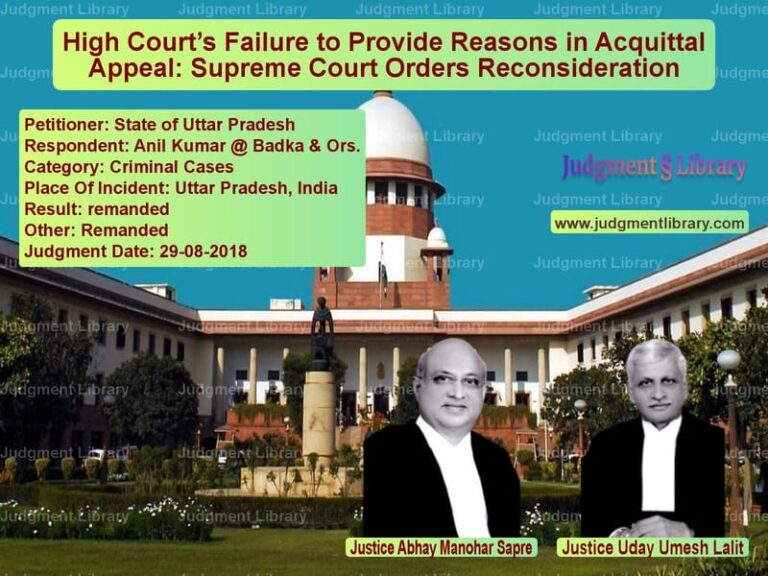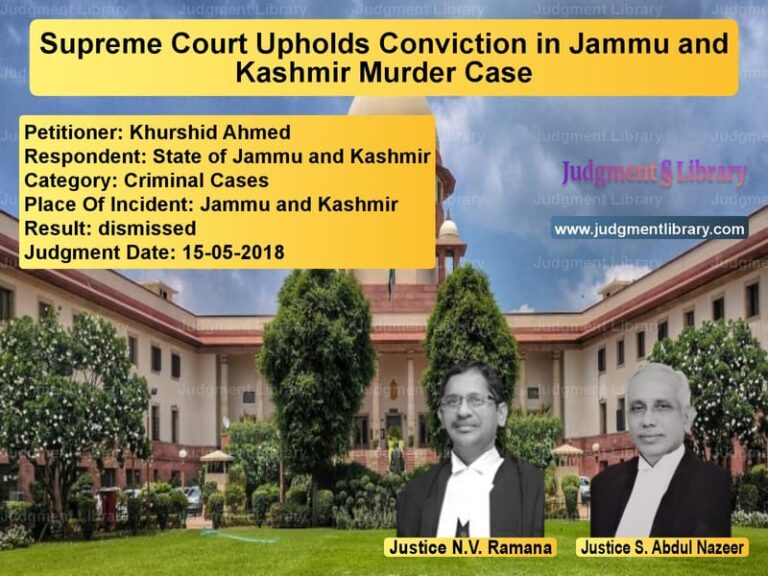Supreme Court Clarifies Service Tax Liability in Lease Agreements: Union of India vs. Bengal Shrachi Housing Development
The Supreme Court of India delivered a significant judgment in the case of Union of India & Ors. v. Bengal Shrachi Housing Development Limited & Anr., addressing the crucial issue of service tax liability in lease agreements. The ruling provided clarity on whether the service tax liability should be borne by the lessor (landlord) or the lessee (tenant) under the Finance Act, 1994.
Background of the Case
The case revolved around a lease deed dated September 1, 2012, executed between the appellants (Union of India) as the lessee and the respondents (Bengal Shrachi Housing Development Limited) as the lessor for commercial premises. The lease was for a period of three years, with a monthly rent of Rs. 16,34,967.
Clause 6 of the lease agreement stated:
“The lessor shall pay all rates, taxes, assessments, charges, and other outgoings of every description which under the statutes are primarily leviable upon the lessor and shall keep the premises free from all encumbrances. Rates and taxes primarily leviable upon the occupier shall be paid by the Government.”
When a dispute arose regarding who should bear the service tax liability, the respondents filed a writ petition in the Calcutta High Court, seeking a direction for the Union of India to pay the service tax. The Single Judge ruled in favor of the respondents, holding that the service tax liability falls on the lessee. The Division Bench of the Calcutta High Court upheld the decision, leading to the present appeal before the Supreme Court.
Key Legal Issues Before the Supreme Court
The Supreme Court examined the following legal questions:
- Whether the service tax liability under the Finance Act, 1994, falls on the lessor or the lessee.
- Whether Clause 6 of the lease agreement mandates the lessee (Union of India) to pay service tax.
- Whether service tax, being an indirect tax, should be passed on to the recipient of the service.
- Whether contractual agreements can override statutory tax obligations.
Arguments by the Union of India (Appellants)
The appellants argued that:
- Under the Finance Act, 1994, the primary liability to pay service tax rests with the service provider (lessor) and not the recipient (lessee).
- Clause 6 of the lease agreement states that taxes “primarily leviable on the lessor” must be borne by the lessor.
- Service tax is different from property tax or other statutory charges and cannot be passed on contractually.
- The lower courts erred in interpreting the lease agreement as imposing service tax liability on the lessee.
Arguments by Bengal Shrachi Housing Development (Respondents)
The respondents contended that:
- Service tax is an indirect tax, which means it is ultimately borne by the service recipient.
- Several High Courts, including the Delhi and Allahabad High Courts, have ruled that lessees are responsible for paying service tax on rental agreements.
- Clause 6 of the lease agreement should be read in conjunction with the nature of service tax, making the lessee responsible for payment.
- Since the government was the lessee, it should fulfill its obligations as per the contract and statutory provisions.
Supreme Court’s Observations
The Supreme Court extensively analyzed the Finance Act, 1994, and relevant rules under the Service Tax Rules, 1994:
- Section 65(105) of the Finance Act defines “taxable service” as including renting of immovable property for commercial purposes.
- Section 68 of the Act imposes service tax liability on the service provider (lessor) unless otherwise specified.
- Rule 2(1)(d) of the Service Tax Rules confirms that in leasing transactions, the primary liability to pay service tax rests with the service provider (lessor).
The Court observed:
“A reading of the Act and Rules makes it clear that the ‘assessee,’ as defined, means the person liable to pay service tax under the Act. In the present case, the taxable service of renting immovable property is provided by the lessor. It is clear that under Section 66B, the levy of service tax is on the value of the service of renting of immovable property provided by the lessor.”
The Supreme Court further ruled that Clause 6 of the lease agreement should be interpreted in accordance with statutory provisions. The term “primarily leviable upon the lessor” indicates that service tax liability rests with the lessor.
Final Judgment
The Supreme Court concluded:
- The primary liability to pay service tax under the Finance Act, 1994, lies with the service provider (lessor).
- The lease agreement cannot override statutory tax obligations.
- The High Court erred in holding that the lessee was responsible for paying service tax.
- The appeal was allowed, and the High Court’s ruling was set aside.
- The respondents (lessor) were directed to bear the service tax liability.
Impact of the Judgment
The Supreme Court’s ruling has significant implications:
- It establishes that service tax is legally borne by the lessor unless otherwise specified by law.
- It clarifies that contractual agreements cannot override statutory tax liabilities.
- It prevents landlords from shifting the service tax burden onto tenants through lease agreements.
- It reinforces that tax obligations must be determined based on statutory provisions rather than contractual clauses.
Conclusion
The Supreme Court’s decision in Union of India v. Bengal Shrachi Housing Development brings much-needed clarity to service tax liability in lease agreements. It ensures that service providers bear their statutory tax obligations and prevents unfair shifting of tax burdens onto tenants. This ruling upholds the principles of taxation and contractual fairness in commercial lease agreements.
Don’t miss out on the full details! Download the complete judgment in PDF format below and gain valuable insights instantly!
Download Judgment: Union of India & Ors vs Bengal Shrachi Housi Supreme Court of India Judgment Dated 07-11-2017.pdf
Direct Downlaod Judgment: Direct downlaod this Judgment
See all petitions in Income Tax Disputes
See all petitions in Tax Refund Disputes
See all petitions in Customs and Excise
See all petitions in Judgment by Rohinton Fali Nariman
See all petitions in Judgment by Sanjay Kishan Kaul
See all petitions in allowed
See all petitions in supreme court of India judgments November 2017
See all petitions in 2017 judgments
See all posts in Taxation and Financial Cases Category
See all allowed petitions in Taxation and Financial Cases Category
See all Dismissed petitions in Taxation and Financial Cases Category
See all partially allowed petitions in Taxation and Financial Cases Category







